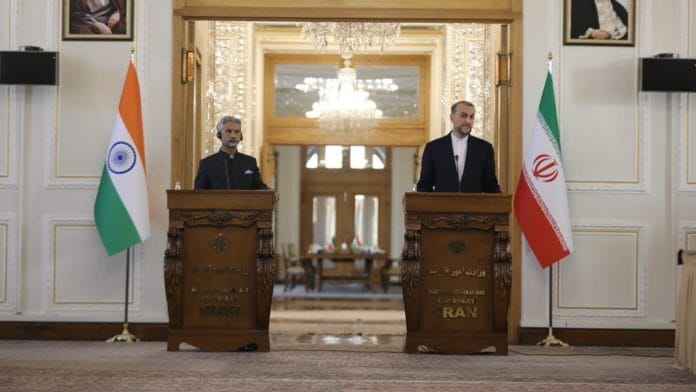New Delhi: Amid the Israel-Hamas war that has put maritime trade through the Red Sea under pressure with attacks from Iran-backed Houthi rebels, New Delhi has reached out to both Tehran and Moscow to discuss the issue, as well as to strengthen bilateral ties.
While External Affairs Minister S. Jaishankar travelled to Iran, Prime Minister Narendra Modi spoke to Russian President Vladimir Putin. The call with Putin came ahead of a possible visit by Modi to Russia later this year, details of which are yet to be decided.
At the same time, regional connectivity — the International North-South Transport Corridor (INSTC) — figured prominently in Jaishankar’s visits to Russia last December and Iran this week. India has been pushing to energise the INSTC project that would see a multi-modal transport corridor connecting Russia to India via Central Asia, Iran and the Caucasus.
Tehran and New Delhi also reached a final agreement on the development of Chabahar — Iran’s only port in the Gulf of Oman and India’s gateway to markets in Central Asia, Afghanistan and Eurasia.
As Jaishankar was discussing regional connectivity projects with his Iranian counterpart, Modi discussed with Putin positive developments in India and Russia’s “Special and Privileged Strategic Partnership”. The two agreed to develop a roadmap for future initiatives and reviewed progress on a number of issues in follow-up to high-level exchanges, according to a statement issued by the Ministry of External Affairs (MEA) Monday.
“Regional connectivity has been a critical pillar of India-Iran relations and was naturally prominent in the agenda of today’s discussions. I reiterated India’s interest in benefiting from Iran’s unique geographical position to access markets in Central Asia, Afghanistan and Eurasia. We discussed the prospects of energising the International North-South Transport Corridor,” Jaishankar said during a joint press conference in Tehran Monday.
“In particular, we discussed India’s involvement in the development and operation of the Chabahar port, a joint project with a joint vision of connectivity. I emphasised India’s commitment to this project, and discussed how we can establish a firm, sustainable and long-term roadmap, for India’s continued involvement over the coming years,” he added.
Jaishankar emphasised the importance of the political leadership actively monitoring the development of Chabahar — a potential key transit hub of the INSTC. The corridor was also discussed during his meeting with Russian Foreign Minister Sergey Lavrov last month.
The INSTC was established by way of an inter-governmental agreement between Iran, India and Russia in September 2002. The 7,200-km multi-modal transportation corridor facilitates the movement of freight between Afghanistan, Armenia, Azerbaijan, Russia, Central Asia and Europe, besides Iran and India as reported by ThePrint earlier.
India and Iran back the INSTC, with New Delhi even proposing to add Chabahar port to the INSTC framework. The first India-bound cargo from Russia — sent by train for the first time using the transport corridor — reached Iran last year, covering roughly 3,800 km through Kazakhstan and Turkmenistan before arriving in India by sea.
Also Read: ‘Shocked, saddened’: India reacts to deadly blasts at ceremony for slain Iranian general Soleimani
Gaza and Red Sea crisis
During his two-day visit to Tehran that ended Monday, Jaishankar also met Iranian President Ebrahim Raisi and Secretary of Iran’s Supreme National Security Council Ali Akbar Ahmadian.
Besides regional connectivity, the two sides also discussed the situation in Gaza.
Iran is reported to have helped the Palestinian militant group Hamas build its military capacity in the run-up to the attack on 7 October on the Israeli mainland which claimed the lives of 1,200 Israelis and saw over 200 being taken hostage. India came out strongly against Hamas’ offensive, with Prime Minister Narendra Modi calling it an act of terrorism.
According to Gazan health authorities, Israel’s retaliation of aerial bombardment followed by a ground offensive has resulted in the deaths of 23,000 Gazans since.
“The deeply concerning situation in Gaza was naturally a subject of our discussions. The loss of civilian lives, especially that of women and children was our primary focus. There is a visible humanitarian crisis that needs to be addressed and the creation of sustainable humanitarian corridors is the need of the day,” Jaishankar said Monday.
“We welcome the international community’s efforts in that direction. India itself has delivered shipments of relief material to Gaza and contributed to the UNRWA (United Nations Relief and Works Agency for Palestine Refugees in the Near East),” he added.
Jaishankar also reiterated New Delhi’s support for a two-state solution: an independent Israel and Palestine, while voicing India’s concerns over the maritime crisis in the Red Sea, in talks with his Iranian counterpart.
“As you are all aware, there has also recently been a perceptible increase in threats to the safety of maritime commercial traffic in this important part of the Indian Ocean. The minister also referred to it,” he told reporters in Tehran. “We have even seen some attacks in the vicinity of India. This is a matter of great concern to the international community. Obviously, it also has a direct bearing on India’s energy and economic interests.”
Tehran is viewed as one of the biggest supporters of the Houthi militia in control of Northern Yemen and its capital Sana’a, as reported by ThePrint earlier. The Houthis in solidarity with Hamas and as retaliation for Israel’s bombardment of Gaza have been targeting commercial ships passing through the Red Sea. At least two Indian flagged ships, MV Chem Pluto and MV Sai Baba, were reportedly attacked by drones there last month.
The attacks saw the Indian Navy deploy frigates and destroyers in the central and northern Arabian Sea to assist merchant vessels in the region.
(Edited by Amrtansh Arora)






